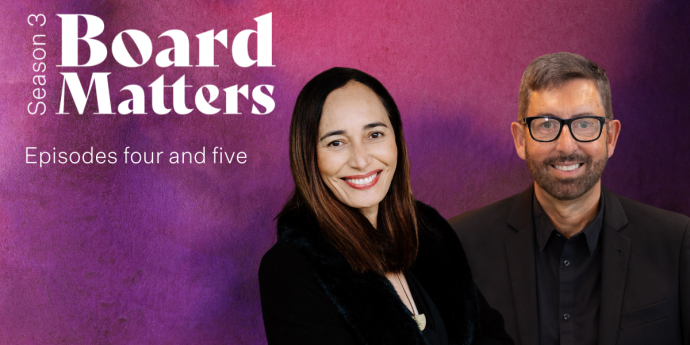Modern organisations need modern boards: Interview with Dan Teo
Boards face the demanding task of keeping pace with organisational shifts. Radically CEO Dan Teo shares how boards can remain relevant.

How do boards in Aotearoa New Zealand set the stage for conversation and debate that allows for all voices to be heard and, importantly, why does this matter?
The speed of technological change continues to impact our daily lives for better or worse – radically altering entire industries and the way we connect with one another – Zoom and Teams enabled us to meet whenever, wherever. But should efficiency override the importance of human connection and what do we lose if we fail to create time to understand others?
With a multitude of challenges before today’s boards, bringing individuals together in a group can test our capacity to hear others – especially under pressure. But to make effective decisions, boards need to understand all angles and perspectives.
This season of the Board Matters podcast, by the Institute of Directors, explores what it means to be guided by trust and creating room for effective decision-making in the boardroom.
Waikato-based director Bella Takiari-Brame CMInstD was thrust into a cutthroat environment overseas in the early days of her professional career, exposed to what she refers to as passive-aggressive behaviour.
She explains to Steven Moe in an episode of Board Matters that communication in meetings could get heated.
“Everyone was an expert in their area and didn't hold back, very conscious of the consequences should they get things wrong. So, the pressure was quite high on management,” Takiari-Brame says.
Working for a multinational company in the UK, she says managers were often directors as well, “so you got to witness that type of behaviour”.
These meetings also weren’t entirely conducive to being open and sharing perspectives: “You couldn't take your whole self into the room,” she says.
Conversely, in New Zealand, being at the bottom of the world might be a benefit. Outside of the cut and thrust of international business, mutual respect and a shared collegiality might be more possible, especially when underpinned by a foundation of biculturalism and Te Tiriti o Waitangi, she says.
In Takiari-Brame's experience, operating with the harder shell needed in an international business context doesn’t translate readily to Kiwi soil. She found this to be the case when sitting on Māori boards – with a culture of respect for elders and taking time to listen, rather than talk.
“We talk about diversity, but diversity is around how people accept each other and compromise and reciprocate respect. I do think that's what trust really, really does empower,” she tells Steven Moe.
Tāmaki Makaurau Auckland-based former aircraft engineer Gavin Fernandez CMInstD says trust enables board members to be comfortable sharing their views.
“It's vitally important in a safe space… it enables board members to constructively challenge other views and be open to discuss their gut feelings and concerns, even if the gut feeling is not fully formed,” Fenandez says.
Speaking to Steven Moe in the final episode of Board Matters, season three, he says this encourages others to disclose issues they might feel uncomfortable about, which has positive outcomes.
“It results in early identification of a problem or an issue that might not be apparent before it becomes a major issue. Importantly, it enhances the agility of the board… the agility of the organisation and you're able to quickly get on top of issues in a way that launches constructive debate,” he says.
Being uncomfortable to ‘not know’ and having the confidence to probe for clarity, is also another likely outcome of embedding trust.
“In some parts of Asia where I was involved on boards, you'd never challenge or argue with some senior people. Whereas in North America, like New Zealand, it's more equal to be able to challenge – It's not rude to challenge constructively,” Fernandez says.
Find out more in episode five of Board Matters where Gavin Fernandez explains the importance of agility and seeking out different views from board members. Bella Takiari-Brame digs deeper on the importance of listening and body language in episode four.
Listen to the latest season of the Board Matters podcast here.